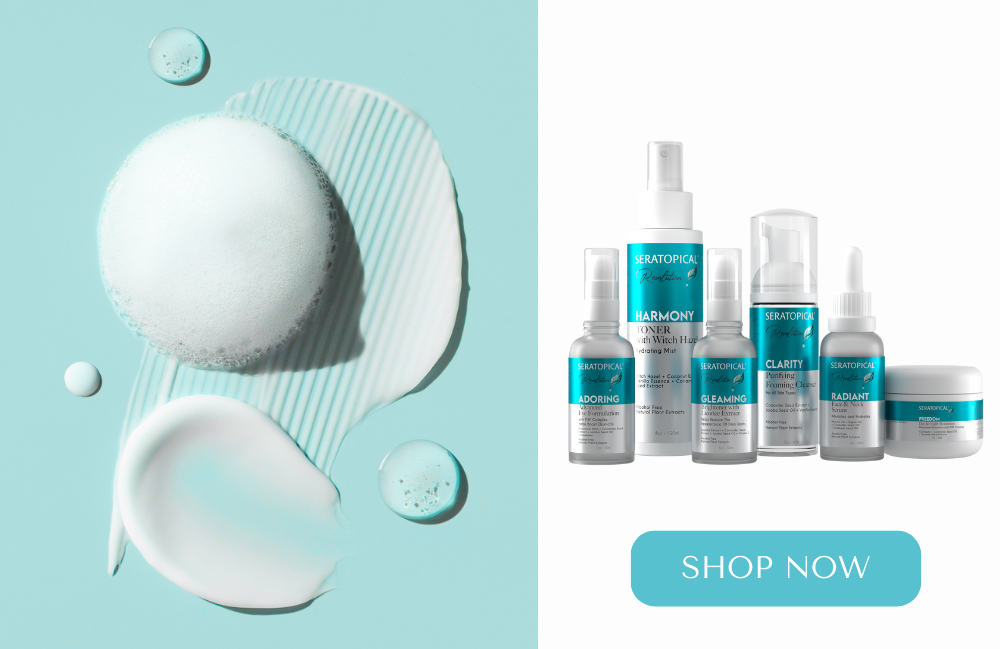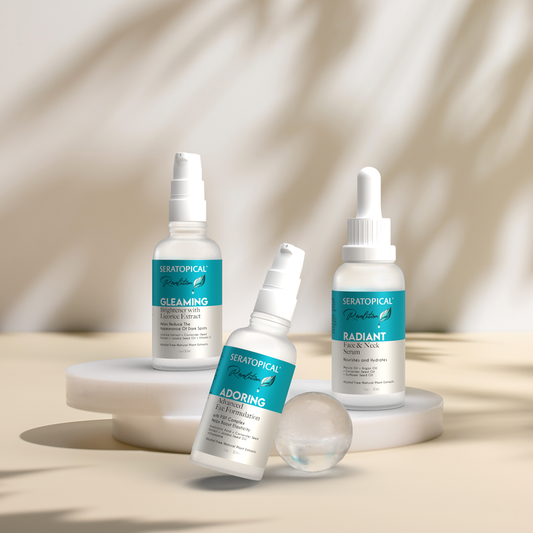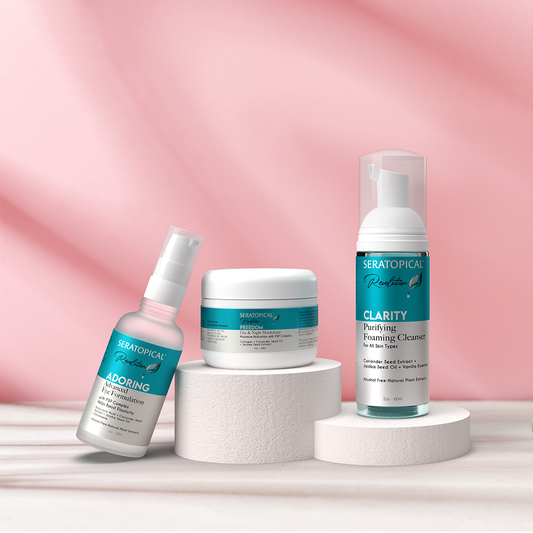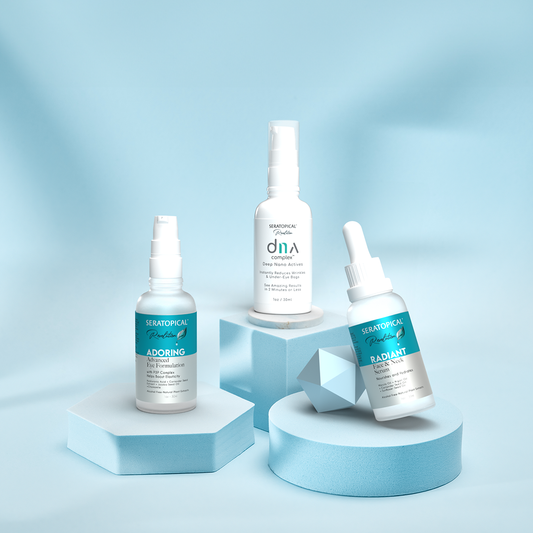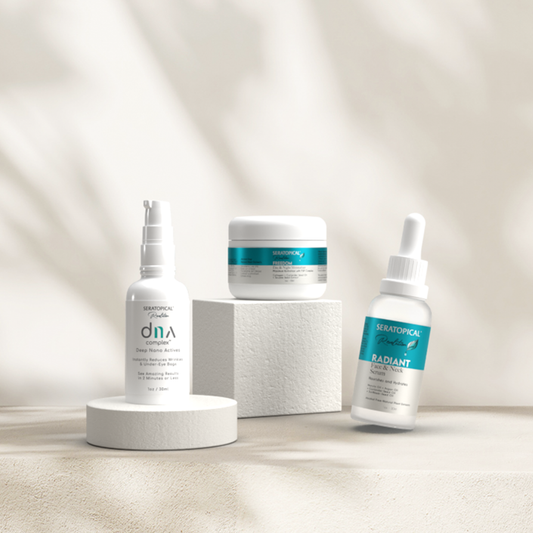It might seem illogical to put oil on your face, since our faces already produce oil and nobody wants an oily face. Oils can seem especially illogical if you have frequent breakouts or oily skin. However, facial oils have a long history in skin care for a reason. Ancient Egyptians reportedly used cosmetic oils as early as 4500 B.C.E. The general point of putting an oil on your face is to help supplement the natural oils that your skin is producing to add moisture and help repair the barrier that keeps that moisture in. Further, if the skin produces too much oil, using a facial oil can help “trick” the skin into producing less oil since a layer is already there. Failing to hydrate the skin is a key component in excess sebum production. The right oil and the right amount of oil can help balance the skin.
What is a Face Oil?
Face oil is a skincare product formulated to hydrate, nourish, and improve the overall health and appearance of the skin on the face. It typically consists of a combination of plant-based oils, extracts, and sometimes essential oils. Face oils are designed to mimic the skin's natural oils and can be used to address various skin concerns, including dryness, dehydration, and signs of aging.
Here are some key points about face oils:
- Hydration: Face oils are known for their ability to provide intense hydration to the skin. They can help replenish moisture and prevent water loss, making them particularly beneficial for individuals with dry or dehydrated skin.
- Nourishment: Many face oils contain antioxidants, vitamins, and fatty acids that nourish the skin. These ingredients can help improve the skin's texture, promote a healthy complexion, and protect against environmental damage.
- Anti-Aging Properties: Some face oils are formulated with ingredients known for their anti-aging properties. For example, oils rich in antioxidants, such as vitamin E or rosehip oil, may help combat free radicals and reduce the appearance of fine lines and wrinkles.
- Balancing: Contrary to common belief, face oils can be suitable for various skin types, including oily and combination skin. Some oils, like jojoba oil, have a composition similar to the skin's natural oils and can help balance oil production.
- Application: Face oils are typically applied as the last step in a skincare routine. After cleansing, toning, and applying any serums or treatments, a small amount of face oil can be gently massaged into the skin. It can be used both in the morning and at night, depending on personal preferences and skin needs.
It's important to note that the effectiveness of a face oil depends on the specific formulation and the individual's skin type. It's advisable to choose a face oil based on your skin's needs and to patch-test any new product to ensure it doesn't cause irritation or allergic reactions.
Benefits of Facial Oil For Your Skin Type
The benefits of facial oil can vary depending on your skin type. Different skin types have different needs, and choosing the right facial oil can help address specific concerns. Here's a breakdown of the benefits of facial oil for various skin types:
Dry Skin:
Hydration: Facial oils provide intense hydration, helping to nourish and moisturize dry skin.
Barrier Repair: Oils can reinforce the skin's natural barrier, preventing moisture loss and promoting a smoother complexion.
Softening: Oils can soften and soothe dry, flaky skin, reducing the appearance of rough patches.
Oily or Acne-Prone Skin:
Balancing: Contrary to common belief, certain facial oils can help balance oil production in oily or acne-prone skin.
Non-comedogenic Options: Choosing non-comedogenic oils like jojoba or grapeseed can provide hydration without clogging pores.
Anti-Inflammatory: Some oils, such as tea tree or chamomile, have anti-inflammatory properties that can help calm irritated skin.
Combination Skin:
Balancing: Face oils can help balance the varying needs of combination skin by providing moisture to dry areas and regulating oil in the T-zone.
Lightweight Options: Opt for lightweight oils like rosehip or squalane that won't feel too heavy on the skin.
Sensitive Skin:
Gentle Nourishment: Facial oils with gentle and soothing ingredients, such as chamomile or calendula, can provide nourishment without causing irritation.
Hypoallergenic Choices: Choosing hypoallergenic and fragrance-free oils can minimize the risk of allergic reactions in sensitive skin.
Mature or Aging Skin:
Antioxidants: Look for oils rich in antioxidants, such as vitamin C or argan oil, to combat free radicals and reduce the signs of aging.
Collagen Support: Certain oils can promote collagen production, helping to improve skin elasticity and firmness.
Normal Skin:
Maintenance: For normal skin, facial oils can be used to maintain a healthy balance and enhance the skin's natural radiance.
Prevention: Oils with anti-aging properties can help prevent premature aging and maintain youthful-looking skin.
When incorporating facial oil into your skincare routine, it's essential to choose oils based on your skin's specific needs and concerns. Additionally, patch-testing new products can help ensure they are well-tolerated by your skin. It's always a good idea to consult with a dermatologist or skincare professional for personalized advice based on your skin type and individual requirements.
How Often Should You Use a Face Oil?
The frequency with which you should use face oil depends on various factors, including your skin type, the specific product you're using, and your individual skincare needs. Here are some general guidelines, but keep in mind that personal preferences and reactions may vary:
- Daily Use:
- Many people incorporate face oil into their daily skincare routine. Applying face oil once or twice a day, in the morning and/or evening, can provide consistent hydration and nourishment.
- Morning Use:
- Some individuals prefer using face oil in the morning as part of their daytime skincare routine. It can act as a protective barrier, helping to lock in moisture and defend against environmental stressors.
- Night Use:
- Nighttime use is common for face oils. Applying oil before bedtime allows it to work overnight to hydrate, repair, and rejuvenate the skin while you sleep.
- Occasional Use:
- For those with oily or combination skin, or for individuals living in humid climates, using face oil less frequently (e.g., every other day or a few times a week) might be sufficient to avoid excessive oiliness.
- Layering with Other Products:
- Consider how face oil fits into your overall skincare routine. It's often applied as the last step, sealing in the benefits of other products. If you use serums or treatments, apply them first and then follow with the face oil.
- Adjust Based on Skin Needs:
- Pay attention to how your skin responds to the frequency of use. If your skin feels well-hydrated and looks healthy, you're likely using the right amount. If you experience any adverse reactions or find your skin becoming too oily, you may need to adjust the frequency.
- Seasonal Adjustments:
- Consider adjusting the frequency based on the seasons. For example, you might need more hydration in the winter when the air is dry, and less in the summer when humidity is higher.
Remember that the key is to find a routine that works for your individual skin needs. It's also important to choose a face oil that suits your skin type and concerns. Always patch-test new products and consult with a dermatologist if you have specific skincare issues or questions.
Let’s Get Scientific
The skin secretes its own oil called “sebum,” through the sebaceous glands. The cells in the stratum corneum, the defensive outer layer of the skin, produce lipids (fats and oils). Together, the oils produced by your skin keep our skin soft, seal hydration in, and protect against environmental pollutants by keeping the stratum corneum (outer skin layer) in tact. Face oils should soothe skin as well as return moisture and smooth lines. However, not all oils are facial friendly. While synthetic and mineral oils are comedogenic and block pores, most natural plant oils are not. There are a few exceptions, such as fragranced plant oils which aggravate the skin like:
- Orange blossom oil
- Bitter orange oil
- Grapefruit oil
- Bergamot oil
- Ylang ylang oil
- Lavender oil
- Lime oil
- Lemon oil
- Rosemary oil
- Neroli oil
- Sandalwood oil
- Peppermint oil
- Eucalyptus oil
Beware of these oils slipping into any of your facial products. Positive plant oils include coconut, jojoba, argan, tea tree, etc… all of which have purported benefits, like anti-inflammatory or antioxidant properties. The greatest purpose of an oil is its moisturizing abilities. Remember: skin cells are like brick and the oil is like mortar. Without mortar or oil, the bricks separate and moisture escapes from the skin (transepidermal water loss). Many people have dry skin because their skin doesn’t produce enough oil to keep that outer layer of skin functional. Like all skin-care products, oils are not for everyone.
Facial oils may be right for you if your moisturizer is not enough and you struggle with occasional (seasonal or climate-related dryness) or flaky or dehydrated skin. Dry or dehydrated skin is most likely to reap the most benefits from using face oils. But don’t rule them out just because you have oily skin. It’s worth talking to your dermatologist about your options beforehand. Skin is a complex organ and no product or ingredient is a cure-all. Facial oils should take a supportive role in a complete skincare routine. If you do decide to try a facial oil, remember to start with a small amount , see how it goes, and then progress from there!
Experience the Glow For Yourself
Embark on a transformative skincare journey and experience the glow for yourself with the Seratopical Revolution line, carefully endorsed by the luminous Nicole Kidman. Begin your ritual with the Adoring Eye Serum, a revitalizing eye serum designed to banish signs of fatigue and awaken the delicate skin around your eyes. Follow it up with the Freedom Day & Night Moisturizer, a hydrating formula that adapts to your skin's needs, providing hydration and nourishment around the clock. Finally, indulge in the DNA Complex, a scientific breakthrough serum infused with innovative ingredients to visibly reduce wrinkles instantly and provide continued results that turn back time.The peptides in dna Complex allow a lift to the face without undergoing any needles or surgery, providing an immediate and durable tightening effect. There’s a reason this is Nicole Kidman’s preferred skincare for under eyes.
Nicole Kidman, the epitome of timeless beauty, champions these products. Unveil a radiant complexion, embodying the essence of youthful vitality with the Seratopical Revolution – a skincare regimen that promises not just results, but an indulgent experience curated by a Hollywood icon.


